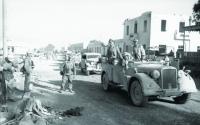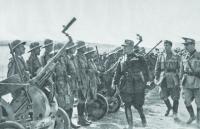This week, 70 years ago, Panzerarmee Afrika, under the command of General Erwin Rommel, retook the Libyan port city of Tobruk.
In January 1941, the Sixth Australian Division had captured the port and its 25,000 man Italian garrison. The following month, German General Erwin Rommel arrived in Libya, together with the German Fifth Light Afrika Division, commanded by Johannes Streich, and the Italian Ariete Armored Division, commanded by Ettore Baldassare. By the end of March, the new German general was on the move. By mid-April, Axis forces had advanced more than 600 miles, driving Commonwealth forces out of Libya - except for Tobruk - which the Axis surrounded on three sides and besieged for 240 days.
Finally, on November 18, 1941, the British Eighth Army, under the command of Lt. Gen. Alan Cunningham launched Operation Crusader, which relieved the siege, and drove the Axis forces out of Cyraenica - the eastern part of Libya.
Today, Tobruk is a city of about 300,000, located in Libya on the Mediterranean Sea less than 80 miles from the Egyptian border. It is 288 miles east of Benghazi, 388 miles east of Agedabia and 630 miles by air from Tripoli. It probably has the best natural harbor in North Africa which made it important for any Axis invasion of Egypt from Libya.
In the six months after the Axis siege of Tobruk was lifted, its defenses had been allowed to fall into disrepair. Without maintenance, sand had filled the trenches and antitank ditches. Many of the mines that protected Tobruk were removed and used on the, now-breached, Gazala Line. Much of its artillery had also been removed. Air superiority had been ceded to the Axis when the RAF abandoned its forward bases for fear of capture and relocated to Sidi Barrani, 150 miles to the east, in Egypt.
Following the Allied defeat at the Battle of Gazala, the British brass was divided as to whether to try to hold Tobruk, as they had done the year before, or to withdraw the entire Eighth Army into Egypt to regroup. It was decided, under pressure from British Prime Minister Winston Churchill, to hold the port with the 2nd South African Division under the command of Major-General Hendrik Klopper, together with: two tank regiments; a battalion each of Coldstream Guards, Sherwood Foresters, Worcestershires, Cameron Highlanders, Mahrattas from India and Ghurkas from Nepal; two artillery regiments and an engineer regiment.
Likewise, the Axis brass was divided as to whether to try to take Tobruk, with the high command wanting to restrain the "Desert Fox," while Malta was attacked. But there was no time, because Rommel attacked immediately, saying, "The time has come to put a lid on Tobruk!"
On June 20, 1942, at 5:40 A.M., precisely, the Axis assault against the city began with a terrifying Stuka dive-bomber attack and artillery bombardment. As a German soldier said, "One must see the Stuka attacks if they are to understand the fall of Tobruk." In addition to the devastating psychological effect of the screaming Stukas diving upon their targets, they were also used to clear the mine fields by dropping bombs on them, which detonated the mines and cleared a path for the land forces. At 7:00 A.M., General Enea Navarini’s XXI Corps of Sabratha, Trento and Pavia infantry divisions, commanded by, respectively Mario Soldarelli, Carlo Gotti and Arturo Torriano, attacked.
At 9:00 a.m., a confident Rommel recorded an announcement for German radio: "Today my troops have crowned their efforts by the capture of Tobruk. The individual soldier may die, but the victory of our nation is assured." The recording was taken to an airfield and flown straight to Berlin for broadcasting that same evening.
The 15th and 21st Panzerdivisiones commanded by, respectively, Eduard Crasemann and Georg von Bismarck and the Ariete Division, now commanded by Giuseppe de Stefanis, swung around the city and attacked from the southeast. Crasemann, commander of 33rd Motorized Artillery Regiment, assumed command of the Division when its commander, Gustav von Värst, was wounded during the battle of Gazala.
By midday, the 15th Panzerdivision had reached the Via Balbia, east of the city, and begun to shell the port. Gen. von Bismarck, leading 21st Panzerdivision in his sidecar, began to attack the city at 5:00 P.M., and within an hour was in the city. The strong points of Forts Pilastrino and Solaro were captured at 7:00 P.M. Shortly before midnight, the harbor and pumping station were captured.
At 6:00 A.M. the next morning, General Klopper sent emissaries to negotiate surrender. They were mistakenly directed to General Navarini, who then directed them to Panzerarmee Afrika’s commander, General Rommel. At 9:40 A.M., General Klopper surrendered the Port and thirty-five thousand of its defenders (21,600 British, 8,900 white South Africans, 1,760 black South Africans and 2500 Mahrattas and Ghurkas), two thousand vehicles, five thousand tons of food and two thousand tons of fuel. However, many more thousands of tons of fuel were destroyed before the Axis could prevent it, prompting a furious Rommel to threaten the Allied soldiers, "You’ll walk, walk, walk all the way to Tripoli for that!"
Panzerarmee Afrika’s losses were 3,360, of which 300 were officers.
After the surrender, the white South Africans asked to be separated from the black prisoners. General Rommel denied the request, noting that, since they wore the same uniform and fought under the same flag, they would share the same facilities!
During the attack on Tobruk, Prime Minister Churchill was conferring with President Roosevelt in Washington, when a telegram was handed to the President. After reading it, he handed the note announcing the fall of Tobruk to Churchill without comment. After the P.M. read the note, the President simply asked, "What can we do to help?" Churchill replied, "Give us as many Sherman tanks as you can spare and ship them to the Middle East as quickly as possible." Not long thereafter three hundred Sherman tanks and one hundred self-propelled guns were on their way to Egypt.
Since the Commonwealth emissaries had first gone to General Navarini’s headquarters, Mussolini spun it that the surrender had been tendered to the Italian General. In response, Hitler bestowed the Field Marshal’s baton on Rommel. (Rommel later told his wife, Lucy, "I would have preferred a division.") This caused the Italian Duce "much pain," since it emphasized, "...the German character of the battle," according to his son-in-law, Italian Foreign Minister Count Galeazzo Ciano.
In response, Mussolini named Generals Ugo Cavallero, Chief of Comando Supremo, and Ettore Bastico, Governor-General of Libya, Marshals of Italy on July 1 and August 12, 1942, respectively. Count Ciano, noted in his diary that this had, "...amused people in Bastico’s case and made them indignant in Cavallero’s."
The Italian Duce had just written a letter to the German Führer asking for fuel for the Regia Marina for the coming Malta Operation. The Axis had agreed that once Tobruk fell, the Axis’ efforts would be shifted to the conquest of Malta.
The British Island of Malta stood astride the convoy lanes from Italy to North Africa - the life line of the Panzerarmee Afrika. The Axis did not have enough strength to pursue the British Eighth Army and take Malta. (In reality, without taking Malta, they didn’t have enough strength to defeat Eighth Army.) Even though everyone understood this, when Field Marshal Albert Kesselring arrived to discuss the situation with Rommel, the new Field Marshal was still itching to chase after Eighth Army into Egypt. He had already given orders dispatching the Deutches Afrika Korps and General Baldassare’s XX Motorized Corps east toward Egypt. General Baldassare would die during an RAF bombing attack on his headquarters on June 26, 1942.
Field Marshal Kesselring, and the Italians, also understood that the further east the Panzerarmee Afrika went, the more difficult the supply situation would become, as almost all supplies that did make it across the Mediterranean came into Tripoli, and from there had to be trucked 800 miles to Tobruk, with the drive getting that much longer as the Panzerarmee Afrika advanced further east. Even so, Field Marshal Rommel immediately issued orders directing the Panzerarmee Afrika to proceed with all due speed east, toward Egypt.
When faced with the unified opposition of his superiors and allies, Field Marshal Rommel went over everyone’s head and pled his case to the Supreme Warlord himself, arguing, "The British are on the run, we should give them no chance to regroup. A later attack on the Nile Delta will need stronger forces and mean higher casualties."
Der Führer didn’t need much convincing. After the losses suffered by the airborne units at Crete, he was hesitant to use them again, even with paratroop commander Kurt Student’s assurances that things would be better this time. Combined with the fact that the Germans would have to rely heavily on their Italian ally in any operation against Malta - which reliance was anathema to Hitler - and that he had his hands full with the Red Army on the Eastern Front, Rommel’s entreaties found a receptive ear. Hitler wrote Mussolini and explained his decision to allow Rommel to continue his advance into Egypt, "Only once, Duce, does the goddess of victory smile upon us. He who fails to grasp her favors at such a moment will never be able to entice her back." The Italian Duce, disregarding the advice of his military, fell under the spell of the siren’s song and responded, "...that the historic moment has now come to conquer Egypt."
Following a meeting with General Bastico and his Chief-of-Staff, General Count Curio Barbasetti di Prun, on the afternoon of June 22nd, near Bardia, Germany’s newest, and youngest, Field Marshal ended by saying, "I now invite you for lunch in Cairo!" The next day, at 7:22 P.M., lead elements of Panzerarmee Afrika crossed into Egypt.
On July 2, Il Duce flew to North Africa in preparation for the Axis’ conquest of Egypt, and had his white charger shipped, planning to accept the salute of the victorious Axis soldiers astride it in the shadow of the Pyramids, which he believed would occur within 15 days. After a month, and the Panzerarmee Afrika not having arrived at Alexandria, let alone the Suez Canal or the Pyramids, nor having been visited by the newest and youngest German Field Marshal, the Italian Duce slunk back to Rome.
On June 25, 1941, Sir Claude Auchinleck replaced Eighth Army’s commander, Niel Ritchie, with himself and prepared the Army to meet the enemy at a tiny train station in the middle of the Sahara Desert, 60 miles west of Alexandria, named El Alamein.
NEXT WEEK: THOUSAND PLANE RAID
Mr. Wimbrow writes from Ocean City, Maryland, where he practices law representing those persons accused of criminal and traffic offenses, and those persons who have suffered a personal injury through no fault of their own. Mr. Wimbrow can be contacted at
wimbrowlaw@beachin.net

